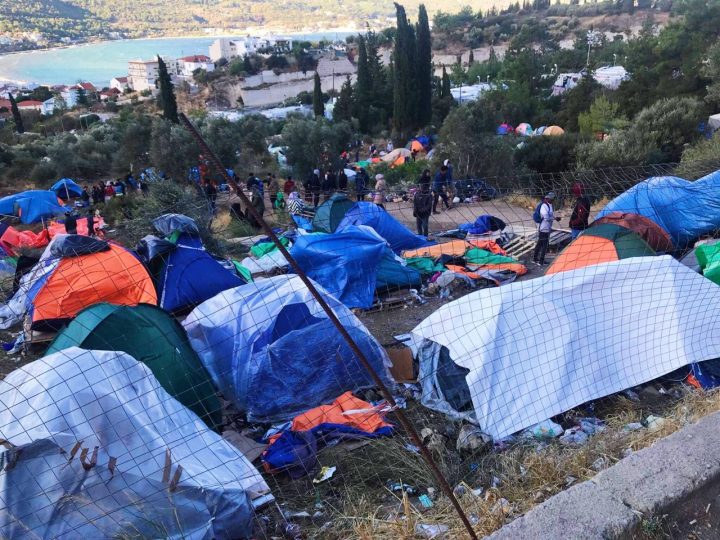On World Refugee Day it is important to remember the ongoing struggles of people living in overcrowded conditions for months on end in Reception Centres. Last week marked an unprecedented change in the dialogue between the Greek State and the volunteers supporting refugees in the island Reception Centres. An NGO, Still I Rise that supports refugee children on the island of Samos providing schooling, support and food to young people is filing a lawsuit against the management of the Reception Centre on the behalf of Unaccompanied Minors past and present on the island.
Following the EU/Turkey deal in 2016 five islands in the Aegean Sea became known as Hotspots. The islands of Lesvos, Chios, Samos, Kos and Leros, which were originally spaces of transit for refugees looking to transfer in to Europe via mainland Greece became overcrowded, with some people waiting within an asylum process for upwards of 18 months.
As the waiting times increased the number of people stuck on these islands also increased. In January 2019 5.000 people were living on the island of Samos on the land of a converted army barracks with space to house only 650. Due to overcrowding in this space official provision was unable to meet the basic needs of refugees with people queueing, we were told in January, for between 2 and 5 hours to access each of the three meals a day provided by the camp. Similarly some of the people living in the expanded area beyond the camps official boundaries, known as ‘the jungle’, found themselves at least a 10 minute walk from toilets and showers. Many women and children chose to use water bottles as makeshift toilets after dark due to the fear of gender based violence.
Against this back drop of a system unable to cope, breaking at the seems and failing to meet the basic needs of the people living within it, there exists a network of volunteers from all over the world looking to plug some of the gaps in provision. Volunteer organisations such as Samos Volunteers provide an educational centre where refugees can engage in classes in English, German, French, and Greek as well as music, fitness and computer skills. They also have a women only space, as well as children’s activities and offer a space for people to simply come and relax, play board games and drink tea. Alongside this they also run a laundry station, providing one of the only opportunities for refugees to wash their clothes on the island. A second organisation, Refugees for Refugees, carry out clothes distributions, providing adults and children with clean and seasonally appropriate clothing on an island that is either cold and stormy in the winter, or 35 degrees with limited shade in the summer.
Alongside this provision a further need arose in the last two years, a space for children and young people on the island to continue their education in a structured environment. Until recently children were unable to enter the Greek school system; the justification given was that they had not had the necessary vaccinations. In the last few months, following a large scale vaccination programme lead by MSF, this looked like it might change. However, whilst the system struggled to catch up an NGO, Still I Rise, formed to meet this need. They opened a school space, Mazi, which welcomes both unaccompanied minors and children travelling with their families. Children have classes in Greek, English and Science as well as film and music at different levels to suit their abilities in English. They are able to stay in the space throughout the school day and are provided with meals, exercise books and a clean, safe and inspiring environment in which to learn and regain their normality.
The environment provided by this NGO stands in stark contrast to the one of the Reception Centre, where many of these children live, either with their families or in a separate section for unaccompanied minors. The toilets these children have access too are often broken or dirty, the tents are not resilient to the elements and there are many stories of people being bitten by rats as they try to sleep. The camp is often dirty with rubbish surrounding the tents and stories of bed bugs and disease. In response to these conditions Still I Rise decided to push back, filing a law suit against the camp manager of the Reception Centre. They are doing this to help to give a voice to the children that they educate on a daily basis and to demand that their rights are protected. In collaboration with a second organisation Help Refugees they have, according to the organisation, gathered evidence, written affidavits and built a class action ‘on behalf of all unaccompanied minors past and present who suffered abuse in the camp’.
This class action may come to nothing, but it is a milestone, a moment when the voluntary organisations that have filled the gaps in provision for so long are choosing to push back. To demand of the Greek state that they do better, that the broader European community pays attention to a humanitarian crisis that, against rhetoric that the crisis is over (European Commission, 2019), continues to let down an entire generation of children stuck on an island living in unimaginable conditions and failing to have their voice heard.
Today, on World Refugee Day it is important to recognise the work of these organisations and to do more to support the plight of refugees forced to live in these conditions.
Dr Gemma Bird (University of Liverpool)
Dr Amanda Russell Beattie (Aston University)










